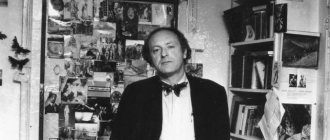“Gangster Petersburg” is a Russian detective television series based on 7 works by Andrei Konstantinov and 3 works by other screenwriters, filmed from 2000 to 2007. The film is about those who are on the other side of the barricades - racketeers, thieves in law, gangster authorities and hired killers. The series turned out to be very successful thanks to its top-notch actors and good script. It is also worth remembering the memorable soundtrack: “The City That Is Not” is still remembered literally from the first verse, and most people inextricably associate it with “Gangster Petersburg”. And the biting, frank remarks of the characters in the series can literally be disassembled into quotes.
Gangster Petersburg - Quotes
“Gangster Petersburg” is a Russian detective television series based on 7 works by Andrei Konstantinov and 3 works by other screenwriters, filmed from 2000 to 2007.
Film 2. Lawyer
Well, you gave it away, boss! Palych almost multiplied me by zero because of you! Nothing is impossible, but in principle everything is possible. The main thing is to know this principle. What is the tone of an offended mademoiselle? So you, Seryozha, have become a murderer. You, Misha, already became a whore when you were going to kill a good kid! Don't show off, your own people turned you in! What kind of boobs, what kind of body, let's use the girl for a bad deed?! During the hours of a hangover, the body is close to death, therefore it strives to realize the instinct of preserving the species. Drink, Valer, don’t be afraid, it’s not poisoned. We won't let anyone rob you. We'll do it ourselves. Oh yeah! There are no lawyers! How not to confuse. Otherwise you go under the same nickname and sleep with the same woman. You know: you are greeted by your clothes, you are escorted by your intelligence. True, sometimes it’s the last journey.
| — In China, the one who saved a person becomes, as it were, his debtor and responsible for his entire future life. - Wait, I didn’t understand something, who owes whom: the one who saved, or the one who was saved? |
| — Would you like a gin and tonic? - I myself am a Genie. |
| “I hope you’re not offended by me?” - I’m not offended... - That’s right, the offended are fucked by all and sundry, and they also carry water... |
- Today there are gorillas, tomorrow they are gone, but we will always be there, artisans because.
| - I feel like Theodore from “Dog in the Manger”, it’s a pity you can’t talk to Lope de Vega. - Don’t worry, if necessary, we’ll get it out of the ground - Whom? - Well, this is Lapodavilova. |
Two men rushed in with a gun and told me to pay, and if they didn’t pay, they would set the store on fire. - Just like we were when we were young. Make fools pray and they will bruise their foreheads. How is your forehead, is it intact?
| - Why did you kill him, Seryozha? “He’s a fag and a scumbag, he helped the mafia, he participated in the murder of my parents.” - But being a fag is not a crime, but rather a misfortune. They forced him to work for the mafia, broke him, and intimidated him. And he had an indirect connection to the murder of his parents. You killed him because he could expose you. You just trimmed the ends. You have become a bandit, Seryozha. |
Some people have started shooting at our Seryozha quite often lately. So they can get there. You will pay him a fee of 200 bucks: 70 for entry and 130 for exit. All women are fools. But there are stupid fools, and there are smart ones, but also fools. They do not think with their heads, but with their sweet spot. There are few people around. There is no one to work with - just idiots. That is why there is a mess in the country. Nowadays, Seryozha, you can steal a bicycle and give up all your health in prison, or you can steal cars and always stay afloat. In Russia, stealing trains is much safer than stealing bicycles, I’m telling you this specifically.
| — And Katya, by the way, is pregnant. - From whom? - From the Holy Spirit! From you, from whom?! |
| - What you want from me? - Valerie, what could we possibly need from you? We're not fagots. We want to talk. |
Yours, Valer, are different. In our yard during the blockade they devoured one babka. So, too, everyone said: “They’re ours, they’re theirs”... Yes, Valer, the only thing you learned to do well in the cops was drink vodka.
| “I don’t want him to live in a country where “Antibiotics” are in charge. - So we need to make sure that they don’t give orders. |
It’s like this: love comes and goes, but you always want to eat.
- We need to work, and not engage in Dostoevism.
“You should always find the reason for all your misfortunes in yourself.” Then there will be fewer problems. We have an amazing country that most of all offends those who fanatically defend it! Or maybe this is the price for fanaticism? Everything is relative. Not every kind person is our friend and not every bastard is our enemy.
| — Near Luga, most likely. If you go, do it now. - Find them, guys. And you will give the old man the greatest joy in all these years. |
Quotes on the topic "Antibiotics"
When Alexander Fleming discovered a table in his laboratory contaminated with the mold Penicillium notatum in 1928, he began a new era of the superiority of science over nature. Since then, antibiotics have saved millions of lives and relieved countless people of suffering. But from the very beginning of this era, scientists knew that it would come to an end. They just didn't know when exactly...
Bacterial resistance to antibiotics is natural and inevitable. By chance, several bacteria will have genes that can protect them from drugs; they will pass these genes on - and not only to their offspring, but sometimes to their neighbors.
Computational epidemiologists are finally getting the data they need and processing it to model the phenomenon. But no one is trying to use these tools to predict the end of the antibiotic era—it's already here.
They are concentrating on understanding how quickly the resistant bacteria will become the majority and what doctors can do about them - if at all.
In 2013, then-Centers for Disease Control and Prevention (CDC) director Tom Frieden told reporters: “If we are not careful, we will soon find ourselves in a post-antibiotic era.” Today, just four years later, this agency says we are in it.
"We're saying this because a universally persistent bacterium has emerged," says Jeanne Patel, who directs the CDC's office of antibiotic strategy and coordination. “People are dying because there are no antibiotics to treat their infections—infections that were very easy to treat not long ago.”
Last August, a woman in her 70s was admitted to a hospital in Reno, PC. Nevada, with a bacterial hip infection. The bacterium belonged to a class of particularly stubborn microbes known as carbapenem-resistant enterobacteriaceae (CRE). But neither carbapenems, nor tetracycline, nor colistin, nor any antibacterial device out of the 26 commercially available, took this bacterium. She died a few weeks later from septic shock.
For health officials like Patel, the case marks the end of an era and the beginning of a new one. The question is: how quickly can this universal resilience spread? “When will we get to a situation where the infection is more often impossible to cure than it is possible? says Patel. “It will be very difficult to predict.”
She knows this for sure, because she has already tried. In 2002, the first vancomycin-resistant staph developed in a 40-year-old Michigan man with a chronic leg ulcer. The situation seemed very sad: staphylococcus is one of the most common infections in humans, and vancomycin is the most common antibiotic to treat it.
In addition, the resistance gene was located on a plasmid - a freely moving ring of DNA, which allowed it to move easily. Epidemiologists at the CDC worked with microbiologists like Patel to create a model predicting how far and how quickly it could spread. Patel doesn't remember the exact numbers, but she recalls the results being frightening. “We were very concerned about this issue,” she says.
Fortunately, in this case the models were wrong. Since 2002, only 13 cases of vancomycin-resistant Staphylococcus have been reported, and all patients survived.
This error greatly puzzled the teams. But in biology sometimes there are such difficulties. “I've worked with this bacterium in laboratories where it grows well but doesn't seem to spread from person to person,” Patel says.
And although they don’t yet know why, one hypothesis suggests that the appearance of this resistance gene does not go unnoticed for the bacterium. It made the staph immune to its nemesis, while making it more difficult to survive outside the human body. Hospital policies, time of year, and geography can also influence spread. It's like trying to predict the weather.
“You can't make these predictions on paper or through careful thought,” says Bruce Lee, a public health researcher at Johns Hopkins. He works with public health organizations in Chicago and Orange County to predict the most likely routes for CRE—bacteria of the type that killed the Nevada woman—to spread if they appeared in hospitals.
In the past, such models were based solely on mathematics, which is how Patel tried to make her predictions. Yes, their equations were complex, but not complex enough to take into account things like human behavior, bacterial biology, and their interactions with the environment.
“In our field, people are increasingly realizing that in order to understand the spread of antibiotic-resistant bacteria in sufficient detail, we need to work with data-driven models that can look at millions of different scenarios, just like meteorologists do.” , says Lee.
In a study Lee published last year, he described the likelihood of CRE spread in 28 hospitals and 74 nursing homes in Orange County. In this model, each virtual hospital had a number of beds that matched the number of beds in real institutions, as well as all information about the connectivity of institutions.
In the model, each patient was a computational unit that, on any given day, either tolerated or did not tolerate CRE. These units moved through the healthcare ecosystem, interacting with doctors, nurses, beds, chairs, doors hundreds of millions of times, and with each new simulation these parameters were slightly adjusted.
He found that without increased control measures, such as routine resistance testing of patients and vector quarantine, CRE would become an endemic disease—ever present—in virtually all Orange County hospitals within a decade.
And once CRE penetrates the healthcare system, it will be difficult to get rid of. “It’s like trying to get termites out of your house,” Lee says. “Once they get into a place where everything is connected to everything, they become a hard-to-treat part of the ecosystem.”
So if doctors can quickly identify people capable of spreading CRE, they may be able to at least isolate the threat. Even if they cannot offer anything to the patients themselves.
The good news so far is that the only cases of human-to-human transmission of a 100% persistent bacteria occur in Lee's supercomputer. In the real world, such cases have not been recorded. But that's exactly what Patel and the CDC are looking for. This will take things to the next level, says Patel.
To keep its finger on the pulse, the agency spent $14.4 million last year to create a network of seven local laboratories capable of genetic testing of bacterial samples taken from hospitals. They are now implementing a program that could one day link every hospital in the United States directly to the CDC's tracking system to automatically flag every event involving antibiotic-resistant bacteria that occurs in the United States in real time.
In parallel, Patel, and, with varying success, the rest of the world, is following the development of antibiotics. Not everything is going smoothly in this area either. Last week, the World Health Organization released a report analyzing all antibacterial drugs in development. The conclusions are grim: not enough drugs, not enough innovation.
For every new drug out of 51 options, microorganisms that are pre-resistant to it can already be found. Researchers like Patel and Lee hope their work will help minimize existing threats, detect new ones as they emerge, and give drug companies time to develop new drugs. The era of antibiotics may be over—but there's still a lot that can be done as a new era dawns.
About the television series “Gangster Petersburg 2”
Wikipedia reports that as many as ten films have been shot - now this can be called seasons - the last of which, alas, as one might expect, turned out to be weak. But let's not talk about that.
Today I want to talk about the second, in my opinion, the top, juicy part, which I am ready to review from time to time. The second part is called “Lawyer”. What are your immediate associations? Right! This is, of course, Antibiotic, Ekaterina Dmitrievna and, in fact, the Lawyer himself, played superbly by Pevtsov. Serebryakov cannot be discounted either. The cast was chosen impeccably and played their best. Even now, after 18 years, thanks to the acting talent, the series keeps you in suspense all the time, as if you don’t know how it will all end.
Of course, the number of mistakes in the series is large: these are signs that were not typical for St. Petersburg in the 90s, and some cars. But does it really matter? Of course, my opinion will be very subjective, since “Gangster Petersburg” can, without exaggeration, be called a cult picture on which many children of the 90s and 00s grew up. I, with my hand on my heart, can safely say that in this case these blunders cannot be called an eyesore, due to the fact that the general atmosphere - the dashing nineties - is conveyed perfectly.
Of course, when we pronounce the phrase “Gangster Petersburg”, we immediately begin to hum that very song under our breath (“... Soooooooooooooooooooooooooooooooooooooooooooooooooooooooooooooooooooooooooaaaaaaaaaaaaaaaaaaaaaaaaaaaaaaaaaaaaaaaaaaag for me for me...."). Most people simply call it a song from “Gangster Petersburg,” but the actual title is “The City That Doesn’t Exist.”
Purely in my personal conviction, the series was doomed to success even before it was shown due to the fact that its production was carried out by the most talented director Vladimir Bortko, who directed the famous film “Heart of a Dog” (1988), Streets of Broken Lanterns (1996), “The Master” and Margarita" and a number of other paintings.







